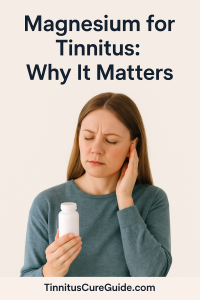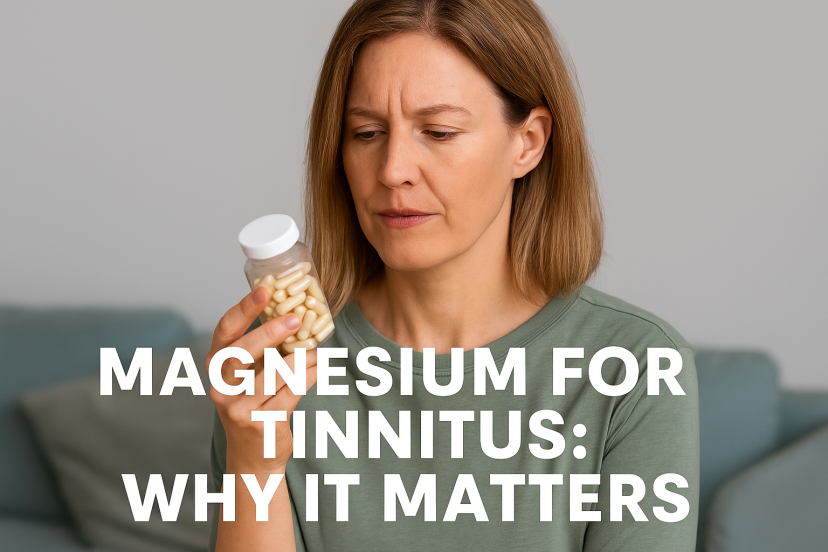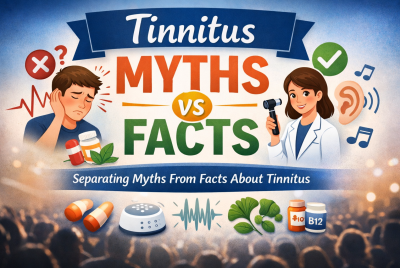Magnesium for Tinnitus: Why It Matters
🔊 Living with the Ring: How Magnesium Might Help
If you’re one of the millions of Americans living with tinnitus — the constant ringing, buzzing, or whooshing sound that only you can hear — you know how frustrating it can be. Sleep suffers, concentration fades, and stress builds, often making the ringing feel even louder. While there’s no single cure, researchers are uncovering the vital role minerals like magnesium play in ear health, nerve function, and stress management. Magnesium, often called the “calming mineral,” supports the body in countless ways — including how it processes sound and protects inner ear structures from damage. Let’s explore why magnesium for tinnitus is gaining attention — and how it may help calm both your ears and your nervous system.
🌿 What Is Magnesium and Why Does It Matter?
Magnesium is an essential mineral involved in over 300 biochemical reactions in the body. It supports:
-
Healthy nerve and muscle function
-
Blood circulation and oxygen delivery
-
Sleep quality and stress balance
-
Regulation of inflammation and oxidative stress
Since the inner ear and auditory nerve rely on magnesium for proper function, a deficiency can increase the risk of hearing issues and tinnitus. Unfortunately, studies suggest that nearly half of U.S. adults don’t get enough magnesium daily — especially older adults, those under chronic stress, or people consuming high-caffeine or processed diets.
🧠 How Magnesium Supports Ear and Nerve Health
1️⃣ Protects the Inner Ear from Damage
The delicate hair cells inside your cochlea (the hearing organ) convert sound vibrations into nerve signals. These cells are easily damaged by loud noise, poor circulation, or oxidative stress.
Research from the National Institutes of Health shows magnesium helps by:
-
Improving blood flow to the inner ear
-
Neutralizing free radicals that harm hearing cells
-
Preventing calcium overload, which can trigger nerve dysfunction
In other words, magnesium acts like a protective shield for your auditory system — especially for those exposed to frequent noise, such as musicians, veterans, or industrial workers.
2️⃣ Calms the Nervous System
Tinnitus often worsens when the brain’s auditory pathways are overstimulated. Magnesium has a natural calming effect on the nervous system, helping to reduce overactivity and promote relaxation.
It supports the production of GABA, a neurotransmitter that lowers anxiety and promotes restful sleep — both crucial for tinnitus relief.
3️⃣ Reduces Stress Hormones
High stress increases cortisol levels, which can heighten tinnitus perception. Magnesium helps regulate the body’s stress response, improving resilience and helping you feel calmer even when the ringing persists.
💬 What the Research Says About Magnesium and Tinnitus
Scientific studies suggest a clear link between magnesium levels and tinnitus severity.
-
A 2011 study in the American Journal of Otolaryngology found that tinnitus patients had significantly lower magnesium levels compared to those without tinnitus.
-
Research from the University of Michigan showed that magnesium supplementation helped reduce the intensity of tinnitus symptoms in individuals with noise-induced hearing loss.
-
Other studies indicate magnesium may improve blood flow and antioxidant protection, both vital for maintaining healthy hearing.
While magnesium isn’t a cure, evidence suggests it can lessen the intensity, frequency, and stress response associated with tinnitus.
🌿 Signs You Might Be Low in Magnesium
Many tinnitus sufferers unknowingly have a magnesium deficiency. Common symptoms include:
-
Muscle twitches or cramps
-
Fatigue or weakness
-
Sleep disturbances
-
Anxiety or irritability
-
Tingling or “pins and needles” sensations
If you notice these along with persistent tinnitus, it may be worth checking your magnesium levels through a simple blood test.
💊 Best Types of Magnesium for Tinnitus Relief
Not all magnesium supplements are created equal. Here are the forms best absorbed and tolerated by most people:
| Form | Benefits | Best For |
|---|---|---|
| Magnesium Glycinate | Gentle on the stomach, supports sleep and relaxation | Stress-related tinnitus, anxiety, insomnia |
| Magnesium L-Threonate | Crosses the blood-brain barrier to support nerve and brain health | Cognitive function and neural support |
| Magnesium Citrate | Improves digestion and muscle relaxation | General use, mild deficiency |
| Magnesium Taurate | Supports heart and blood vessel health | Circulatory and vascular tinnitus |
| Magnesium Malate | Helps with fatigue and chronic pain | Those with fibromyalgia or tension |
🧘♀️ Tip: Start with 200–400 mg daily, preferably with food. Too much can cause loose stools, so adjust your dose gradually.
🌙 How Magnesium Helps with Sleep and Stress (Key for Tinnitus Relief)
Sleep and stress are two of the biggest triggers for tinnitus flare-ups. Magnesium plays a critical role in both:
🌙 Improves Sleep Quality
Magnesium regulates melatonin (the sleep hormone) and helps muscles relax, making it easier to fall asleep. Many U.S. users report fewer nighttime tinnitus spikes after adding magnesium before bed.
💆♂️ Reduces Anxiety and Muscle Tension
By calming the nervous system, magnesium helps you feel more balanced and less reactive to stress — one of the most common tinnitus amplifiers. Pairing magnesium with relaxation techniques like deep breathing or progressive muscle relaxation enhances its effects.
🥗 Natural Food Sources of Magnesium
Before relying on supplements, add magnesium-rich foods to your daily meals. These whole foods nourish your ears and nerves while promoting overall wellness:
✅ Top Magnesium Foods
-
Leafy greens (spinach, kale, Swiss chard)
-
Nuts and seeds (almonds, cashews, pumpkin seeds)
-
Avocados
-
Bananas
-
Whole grains (brown rice, oats, quinoa)
-
Dark chocolate (70% cocoa or higher)
-
Legumes (black beans, chickpeas, lentils)
Eating a magnesium-rich diet also supports heart health, blood pressure regulation, and stress balance — all of which indirectly improve tinnitus management.
🔊 Combining Magnesium with Other Natural Tinnitus Remedies
Tinnitus is often multifactorial, meaning several body systems influence its intensity. Combining magnesium with other proven natural aids can enhance relief.
🌿 Complementary Supplements
-
Ginkgo Biloba – Improves blood flow to the inner ear.
-
Vitamin B12 – Supports nerve repair and energy metabolism.
-
Zinc – May improve hearing-related tinnitus in deficient individuals.
-
CoQ10 – Enhances mitochondrial and vascular function.
🧘♀️ Lifestyle Strategies
-
Practice mindfulness meditation or gentle yoga to lower cortisol.
-
Use sound therapy apps like ReSound Relief or myNoise for nighttime calm.
-
Stay hydrated and avoid excessive caffeine, which can deplete magnesium.
-
Get consistent aerobic exercise (walking, swimming, cycling) to improve blood flow.
When used together, these strategies support a holistic tinnitus management plan.
⚕️ When to See a Doctor or Audiologist
Although magnesium may help reduce tinnitus severity, it’s essential to rule out underlying conditions that need medical attention.
See a healthcare provider if you experience:
-
Sudden onset of tinnitus or hearing loss
-
Tinnitus in only one ear
-
Pulsatile tinnitus (rhythmic sounds matching your heartbeat)
-
Dizziness, vertigo, or balance problems
-
Ear pain, drainage, or pressure
An ENT or audiologist can perform hearing tests, imaging, and lab work to identify whether your tinnitus stems from earwax buildup, medication side effects, hypertension, or circulation issues.
If your doctor confirms no structural damage, supplementing with magnesium and adopting lifestyle changes may safely support your recovery.
❓ FAQs About Magnesium for Tinnitus
1️⃣ Can magnesium really help tinnitus?
Research suggests magnesium supports inner ear function, circulation, and nerve health — which may reduce tinnitus intensity in some individuals.
2️⃣ How long does it take to notice results?
Most users report improvement within 4–8 weeks of consistent use, especially when combined with better diet and sleep habits.
3️⃣ Is it safe to take magnesium daily?
Yes. The recommended dietary allowance (RDA) is around 310–420 mg/day for adults. Avoid exceeding 500 mg daily unless under medical supervision.
4️⃣ Which magnesium supplement works best for tinnitus?
Magnesium glycinate or L-threonate are top choices for nerve health and stress reduction.
5️⃣ Can low magnesium cause tinnitus?
Yes, deficiency can impair nerve and blood vessel function in the ear, increasing tinnitus risk.
6️⃣ What time of day should I take magnesium?
Evening is ideal — magnesium promotes calmness and supports deep sleep, which can make tinnitus feel less intrusive.
7️⃣ Can magnesium interact with medications?
Magnesium may interfere with certain antibiotics, diuretics, or blood pressure drugs. Always discuss supplements with your healthcare provider.
🌈 Final Takeaway: A Simple Mineral with Big Impact
Tinnitus can feel overwhelming, but relief often begins with small, consistent changes. Magnesium for tinnitus is one of the simplest and most natural ways to support your body’s ability to relax, repair, and protect your hearing.
By replenishing this essential mineral, you can:
-
Strengthen nerve and ear function
-
Promote calmness and better sleep
-
Improve circulation and stress resilience
Whether through diet or supplements, maintaining healthy magnesium levels can bring both your mind and ears closer to balance — helping you take control of your tinnitus one day at a time.
⚕️ Medical Disclaimer
This article is for informational purposes only and is not a substitute for professional medical advice, diagnosis, or treatment. Always consult a qualified healthcare provider before starting any supplement or treatment for tinnitus.

- Does Ginkgo Biloba Really Help With Tinnitus?
- 10 Natural Remedies for Tinnitus That Actually Work
- Tinnitus After Ear Infection: What You Need to Know






